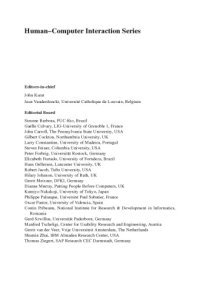
Ebook: A Journey Through Cultures: Metaphors for Guiding the Design of Cross-Cultural Interactive Systems
- Tags: User Interfaces and Human Computer Interaction, Computers and Society, Computational Linguistics, Cultural Studies
- Series: Human–Computer Interaction Series
- Year: 2013
- Publisher: Springer-Verlag London
- Edition: 1
- Language: English
- pdf
A Journey Through Cultures addresses one of the hottest topics in contemporary HCI: cultural diversity amongst users. For a number of years the HCI community has been investigating alternatives to enhance the design of cross-cultural systems. Most contributions to date have followed either a ‘design for each’ or a ‘design for all’ strategy.
A Journey Through Cultures takes a very different approach. Proponents of CVM – the Cultural Viewpoint Metaphors perspective – the authors invite HCI practitioners to think of how to expose and communicate the idea of cultural diversity. A detailed case study is included which assesses the metaphors’ potential in cross-cultural design and evaluation. The results show that cultural viewpoint metaphors have strong epistemic power, leveraged by a combination of theoretic foundations coming from Anthropology, Semiotics and the authors’ own work in HCI and Semiotic Engineering.
Luciana Salgado, Carla Leitão and Clarisse de Souza are members of SERG, the Semiotic Engineering Research Group at the Departamento de Informática of Rio de Janeiro's Pontifical Catholic University (PUC-Rio).
A Journey Through Cultures addresses one of the hottest topics in contemporary HCI: cultural diversity amongst users. For a number of years the HCI community has been investigating alternatives to enhance the design of cross-cultural systems. Most contributions to date have followed either a ‘design for each’ or a ‘design for all’ strategy.
A Journey Through Cultures takes a very different approach. Proponents of CVM – the Cultural Viewpoint Metaphors perspective – the authors invite HCI practitioners to think of how to expose and communicate the idea of cultural diversity. A detailed case study is included which assesses the metaphors’ potential in cross-cultural design and evaluation. The results show that cultural viewpoint metaphors have strong epistemic power, leveraged by a combination of theoretic foundations coming from Anthropology, Semiotics and the authors’ own work in HCI and Semiotic Engineering.
Luciana Salgado, Carla Leitão and Clarisse de Souza are members of SERG, the Semiotic Engineering Research Group at the Departamento de Informática of Rio de Janeiro's Pontifical Catholic University (PUC-Rio).